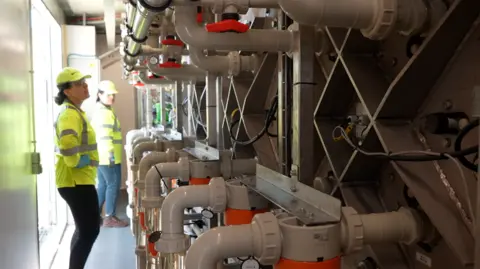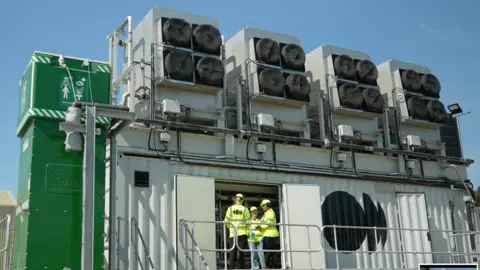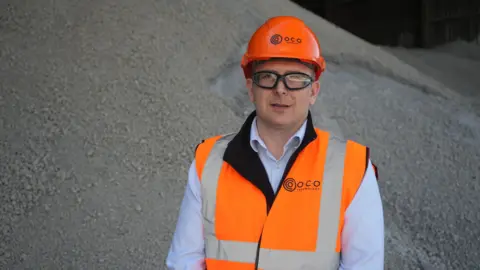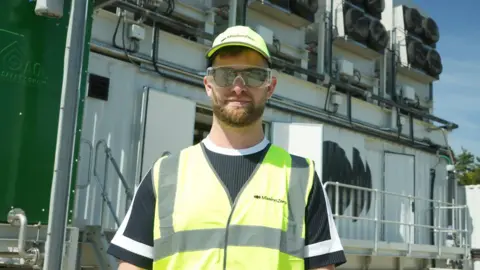CO2 capture project hopes to bring 'quality' jobs
 Jamie Niblock/BBC
Jamie Niblock/BBCA company behind one of the UK's first carbon capture projects hopes to provide "high quality green jobs" in the region.
Mission Zero's direct air capture plant at Wretham in Norfolk will remove carbon dioxide (CO2) from the atmosphere and use it to create limestone building materials.
"We're demonstrating one of the pioneering processes of the future in an area you wouldn't normally associate with it," said Nicholas Chadwick, co-founder of Mission Zero.
O.C.O. Technology, which produces the limestone aggregate, said: "A significant number of construction projects in the locality are going to have a lower carbon footprint".
 Jamie Niblock/BBC
Jamie Niblock/BBCO.C.O. is already up and running in Wretham, turning fly ash or slag into "sustainable aggregate" for use in roads and buildings.
It previously had to import manufactured CO2, but will now also be able to use the gas captured on site by the Mission Zero system, which the two companies claim is a world first.
Direct carbon capture is seen as one of the solutions to climate change, as it removes CO2 from the atmosphere and locks it away. Levels of CO2 have risen by 40% since 1900 and are causing the planet to warm rapidly, along with other heat-trapping gases like methane.
Graham Cooper, managing director of O.C.O Technology, said: "Direct air capture is so necessary to reaching net zero and reducing carbon in the atmosphere".
He said it was "important that people can feel their region is contributing to moving things forward".
 Jamie Niblock/BBC
Jamie Niblock/BBCDr Chadwick said it was important for people with the relevant skills from other industries to become part of the "green transition".
"These are high quality, complex jobs. Come and use your skills to suck CO2 out of the atmosphere," he said.
He added that Mission Zero was about "redefining humanity's relationship with carbon".
"Carbon has made the world good, it's provided everything we've needed – it's just where we get the carbon from is the issue.
"Usually it's from an unsustainable source: fossil fuels. But CO2 from the atmosphere can be used to displace that," he said.
 Jamie Niblock/BBC
Jamie Niblock/BBCDr Chadwick is not daunted by the scale of the task.
The UK emitted an estimated 406.2 million tonnes of greenhouse gases in 2022, whereas Mission Zero's plant is able to remove 250 tonnes of CO2 per year.
"It's a real working chemical plant sucking CO2 out of the atmosphere and locking it away so it can't warm the planet again.
"You need to prove the tech, scale it, make it cheap.
"The 2020s is about demonstrating this is real, not a magic far-flung thing that could happen in decades to come," he said.
Follow Norfolk news on BBC Sounds, Facebook, Instagram and X.
